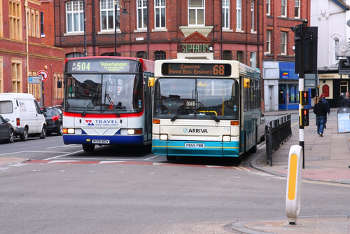Wolverhampton Council is set to develop a Statutory Quality Bus Partnership (SQBP) for the city centre, using existing legislation.
It said ‘major benefits’ of the partnership would include the improved quality of buses and better control of operators within the city centre ring road, as well as improving air quality.

Buses in Wolverhampton
The council will be working with Transport for the West Midlands (TfWM), the transport arm of the new West Midlands Combined Authority, to consult bus operators, with a view to implementing the scheme from early 2017.
A spokesperson for Wolverhampton told Transport Network the council plans to use existing legislation under the Transport Act 2000 provisions ‘but using the Local.Transport Act 2008 as the guidance and framework for the implementation’.
Pete Bond, TfWM’s director of transport services, said: ‘Working closely with Wolverhampton on this and other transport schemes such as the Interchange project, makes it easier to deliver the sort of high quality public transport that passengers need and deserve.’
The partnership will set an agreed emissions standard for buses, with the plan to allow only buses that meet that standard within the city centre by 2021/22.
Councillor Steve Evans, cabinet member for city environment, said: ‘The partnership will help us better control the quality of vehicles, emissions standards and the management of bus stops and stands to ensure reliability of journey times within the city centre.
‘The scheme will go a long way to improving the city centre environment for pedestrians and bring an improvement in services for commuters.’
Within the scheme area, all bus stopping areas would be subject to a Traffic Regulation Order which would allow the dwell time for vehicles to be restricted and controlled.
TfWM would then be able to operate a booking system for all on street space within the SQBP area, which would result in guaranteed slots for operators at bus stops and stands.
The council said operators would benefit from guaranteed timings for their services and the city would have greater control of how vehicles operate. It added that this would reduce instances of congestion caused by queuing or waiting buses.
The Bus Services Bill will bring in new ‘Enhanced Partnership’ powers to will enable councils to work with bus operators ‘to set a vision for bus services in their area and a plan to help achieve those improvements’.
Register now for full access
Register just once to get unrestricted, real-time coverage of the issues and challenges facing UK transport and highways engineers.
Full website content includes the latest news, exclusive commentary from leading industry figures and detailed topical analysis of the highways, transportation, environment and place-shaping sectors.
Use the link below to register your details for full, free access.
Already a registered? Login